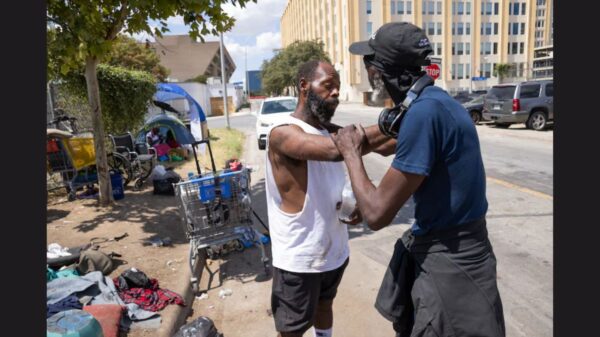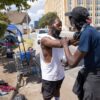By Ayesha Hana Shaji
Texas Metro News Team

Castanita Fitzpatrick
Castanita Fitzpatrick first experienced homelessness when she was 10 and for the past 31 years, she has lived in and out of extended stay facilities.
Last August – she lost everything and became homeless. Once again she turned to extended stays hotels as a better option than trying to secure an apartment with the exorbitant fees and requirements.
From criminal background checks and credit checks to deposits and other strict rental application processes, finding affordable and stable housing for prior convicts and those with a history of homelessness is a major challenge, said Christine Crossley, Director of the Office of Homeless Solutions at City of Dallas.
Extended-stay hotels have become a popular option for these individuals. Texas Metro News called 15 extended stay hotels across the Dallas-Fort Worth metroplex and found a week’s stay cost around $400 to $650, depending on the area and most were filled to capacity.
Also depending on the area, some facilities are plagued by negative reviews, including complaints of being drug and bug infested.
Texas Metro News spoke to three women who have been in extended stay places multiple times. While the situations leading to their housing crises were different, they all faced similar obstacles in an area where finding affordable housing is challenging.
“I stayed in motels, last year, off and on, for five to six months, depending on funding,” Fitzpatrick said, adding that housing was so expensive and she didn’t have a stable enough job to pay for the rent.
“I had to pay for my peace,” Fitzpatrick said about the North Dallas Motel where no stay. “I really had to pay for my peace.”
Her faith in God and her determination to not go back to where she was as a child was her motivating factor, said the survivor leader, author, and motivational speaker.
“Even though I was staying in extended stays, working Instacart and paying that high rent, the back of my mind was telling me that I’m no longer that shy little girl anymore that was out there for 31 years,” she said.
Fitzpatrick said she has been in recovery, “clean, sober and free” from 31 years of abuse, for 12 years now.
But apartments were still a far fetch as there were so many additional charges to consider, like application and administrative fees, she said.
Even if she could overcome those challenges, the chances of her application getting rejected due to her past criminal history, lack of stability and bad credit made it difficult to secure an apartment.
“Because of my felony, most apartments back then, before my expungement, made me pay double the rent because I have prostitution and drug cases,” Fitzpatrick said. “And so trying to get an apartment, it’s very hard.”
As a victim of sexual exploitation and homelessness, Fitzpatrick had spent years being under someone else’s control. Coming out of that life, she said she felt like she could do better for herself, by herself.
The management at the extended stay she chose made her feel safe and at home, she said. The stability and security she felt made it worth paying the expensive rent prices.
“Yes, I could have put that towards an apartment, you know, but I would have to still be living outside or living in my car,” she explained.
The City of Dallas’ definition of homeless is someone who is chronically homeless, and is living outside, Fitzpatrick said. When someone is staying at extended stay spaces, they are able to manage themselves and put some sort of roof over their head.
She said the City of Dallas needs to segregate different housing situations and should support those who can pay rent but are barred from stable housing in a better manner.
Currently, Fitzpatrick is living with a friend and does motivational speeches across the Dallas-Fort Worth metroplex.
Fitzpatrick also published her autobiography that walks its readers through her journey to salvation from sexual exploitation, prostitution and drug addiction, titled “31 Years in the Desert,” and is available on Amazon for purchase.

Lakeitha Parish
In 2015, Lakeitha Parish found herself living in a motel in North Dallas with her daughter, paying almost $500 a week. This was not her first time living in such a space – she had previously spent a year in extended stay spaces and her experience had left a lasting impact.
“When you have been sexually exploited or trafficked your life, those add up on you,” Parish said. “Going to jail…it makes it difficult to find a decent place to stay.”
Parish’s past had led her to a point where she felt stuck in a cycle of exploitation and trauma. Even when she did want to find an out, somewhere to go, Parish said the system made it almost impossible to get out, leading her back to the place where her life first fell apart.
“You can find a place to stay, but they want an arm and a leg or they want you to jump through all these hoops to get a place to stay or you’re going to be in a place which is like the extended stay even though you wanted an apartment,” she said. “It’s still the area where your life fell apart in the first place.”
Life in an extended stay was lonely and scary, she said, describing it as “like sleeping with one eye open” due to the prevalence of drugs and prostitution in the area. Her daughter “lived in fear” during their time there.
Parish said shelters were never an option because crowded places triggered her trauma.
“Once you’re sexually abused, you’re constantly looking over your shoulder,” she said. “To this day, there are still things that I’m not totally healed [of]. “There are still things to this day that trigger me or make me walk [in] the opposite direction.”
But Parish said she was determined to find a way out. She eventually found a job, but it was a low-paying position that required long hours and kept her away from her daughter.
“It forces you to depend on other people to help you with your child, which you know, in this life, it’s hard to trust people,” she said. “And at that time, [my child] was my most precious gift. That was the most precious thing that I had.”
Parish said she took classes with the Housing Voucher Program which then assisted her in filing for Section Eight; government-regulated housing that provides rental assistance to low-income families, the elderly and disabled individuals. Within a year, her sister and she were able to find an apartment that they now share.
However, Parish complained about shelters and said the City needs to do a better job of advertising resources. Putting the resources that are available to folks like her needs to be on billboards and notices on the roadsides, not on TVs and phones, she said.
Today, Parish said she is in a much better place than she was in 2015. She is a school bus driver and a Commercial Driver’s License trainer. But the trauma she experienced during those difficult years still follows her.
She stressed the importance of offering counseling sessions to not only the homeless but those who experienced homelessness in the past.
“My past, my addiction, the charges that you receive from the life that you had to live just to survive…unless you can get it expunged, it does follow you,” Parish said.

Cierra Sanford
Cierra Sanford has endured a life marked by pain and struggle. Sanford said she has sought refuge in extended stays at least 10 times since March 2018. Her longest stay, which lasted five months in 2019, was with two of her three sons.
Staying at extended-stay hotels makes her feel like she is not in a good place and she does not feel safe, she said. But it was better than her other options.
“Extended stay for me was somewhere my kids can rest and not be on the pavement, or on the floor of someone else’s home or in a car, in the woods, the trenches or gutters,” she said. “It’s survival.”
These spaces, however, can be expensive as well. Depending on what side of town and city you’re in, they can cost a fortune, Sanford said.
She said, many times, her friends and mentors have been kind enough to pay for her extended stays so she can provide her children with some sort of peace and solace.
Sanford is a victim of domestic violence, which has had a profound impact on her mental and physical well-being, she said. She revealed that she was not only abused by the three fathers of her three children but also by her own father.
When she was 18, she was also incarcerated for five years for aggravated robbery with a deadly weapon.
As a result, she fails background checks and her not having a stable source of income due to her disability means she has a bad credit history as well. This makes it hard to move for her to improve from unstable housing situations, she said.
Sanford said she is challenged when trying to improve her unstable housing and the City does very little to help.
“The way that I feel is based off of experiences that I have needed,” she said. “They did not show up for me or if they did, they did not do what their badge requires them to do for me and my family.”
She and her children were homeless for more than 30 months.
Due to her disability and severe homelessness, Sanford currently has Section 811 housing, a kind of affordable and accessible rental-based housing provided by the government for extremely low-income people with disabilities. Her rent is partially subsidized by the City.
So the CIty is actually helping.
“I’m at a good place right now. I’ve got tears falling, but I’m happy. You know, I mean, I really am at peace. My life is coming together,” she said. “But I don’t feel safe.”
Sanford said she does not have a stable source of income due to her many disabilities, both physical and mental, and the lack of transportation. With whatever money she has, she supports her family, and pays child support for her child who stays with his father.
From criminal background checks and credit checks to deposits and other strict rental application requirements, finding affordable and stable housing for the formerly incarcerated and those with a history of homelessness is a major challenge, said Christine Crossley, Director of the Office of Homeless Solutions at the City of Dallas.
Extended-stay hotels have become a popular option for these individuals. Texas Metro News called 15 extended stay hotels across the Dallas-Fort Worth metroplex and found a week’s stay cost around $400 to $650, depending on the area, and most were filled to capacity.
Also depending on the area, some facilities are plagued by negative reviews, including complaints of being drug and bug infested, or havens for criminal deviants and activity.
While these three young ladies may not have been the targeted guests when many extended stay hotels were established, or Extended Stay America began operation in the late 1990s when the business model focused on corporate housing, seasonal workers, mini vacations or even families waiting for either repairs on or the completion of their homes; the reality is they are home for many today.
During tragedies, like the COVID pandemic or Hurricane Katrina; extended stay hotels were the go-to places for the displaced.
Extended stay hotels are the solution for many who are without a home.
Ayesha Hana Shaji is a 2022 honors graduate with Bachelors degrees in Journalism and Psychology from the University of Texas at Arlington.
SOLUTIONS JOURNALISM: Texas Metro News team members have participated in listening sessions, worked on several stories dealing with societal ills like housing and poverty, and collaborated with others to report on those who are working to make a difference. Thanks to the generous support of the Dallas Media Collaborative - launched by the Solutions Journalism Network with funding from the Knight Foundation, Solutions Journalism Network, American Press Institute, Fund for Equity in Local News, Google News Initiative, NNPA, and the Don’t Believe the Hype Foundation; we’re sharing what we’ve learned.









You must be logged in to post a comment Login